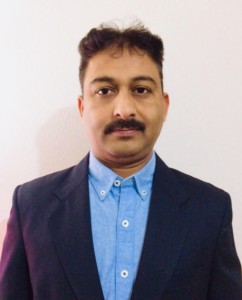PRAIRIE VIEW, TEXAS (February 11, 2022)The Centers for Disease Control and Prevention consistently lists non-communicable diseases such as cancer as the leading cause of death worldwide. Engaging in global health research is essential to move forward discoveries and knowledge that impact developed and developing countries. Gururaj M. Neelgund, Ph.D., assistant professor of chemistry in the Brailsford College of Arts and Sciences at Prairie View A&M University (PVAMU), recently earned an award of $174,852 from the National Academy of Sciences that underscores that point.
Neelgund’s research project, “Photoactive biocompatible carbon-based Nanocomposites for Theranostic Nanomedicine,” was submitted with Dr. Amin of Cairo University. The U.S. – Egypt Science and Technology Joint Board funded less than 10% of the eligible proposals in a highly competitive funding cycle.
Neelgund currently serves as an assistant professor of chemistry in the Brailsford College of Arts and Sciences. Upon learning that the research was funded, Neelgund states, “I was excited because this is my first independent grant.”
This research is about developing nanomaterials for photothermal therapies of cancer to advance cancer treatment. It is a collaboration between chemistry and biology. Neelgund will work with Amin, a biologist in Egypt who will lead the cancer research team. The project will be an integration of both chemistry and cancer research.
Neelgund is most looking forward to advancing the feasibility of cancer therapy. Currently, nanomaterials for cancer photothermal therapy are developed using gold nanoparticles. The process is expensive, and access is not feasible for many who need it. Neelgunds research will replace gold with copper sulfide. This new approach makes the therapy less costly and more easily accessible and viable for a broader group of those in need.
In this interdisciplinary study, Neelgund will advance cancer’s current photothermal therapy (PTT). He will design and develop novel near-infrared (NIR) active photothermal agents comprised of graphene oxide, folic acid, and transition metal dichalcogenides (TMDs).
Neelgund’s funding will allow undergraduate and graduate students to have hands-on experience in chemistry, nanotechnology, and cancer research.
PVAMU recently earned Carnegie designation as a Research 2 (R2) university. Neelgund states this funding “supports PVAMU research in terms of journal publications. It will also help further publications by using its results as basic results for external study”.
The International Agency for Research on Cancer (IARC) estimates 17 million new cancer cases in 2019 worldwide. It is a leading cause of death in both the United States and Egypt. Both countries need to address the global cancer problem and are uniquely positioned to work together to advance cancer research progress.
Global collaborative research is inevitably associated with challenges. However, it is necessary to move beyond the would-be barriers, understand complex questions, and introduce new knowledge to cancer research. Neelgund says, “to save lives, cancer research is important as cancer is the second leading cause of death around the globe.”
###
Karen B. Cotton


